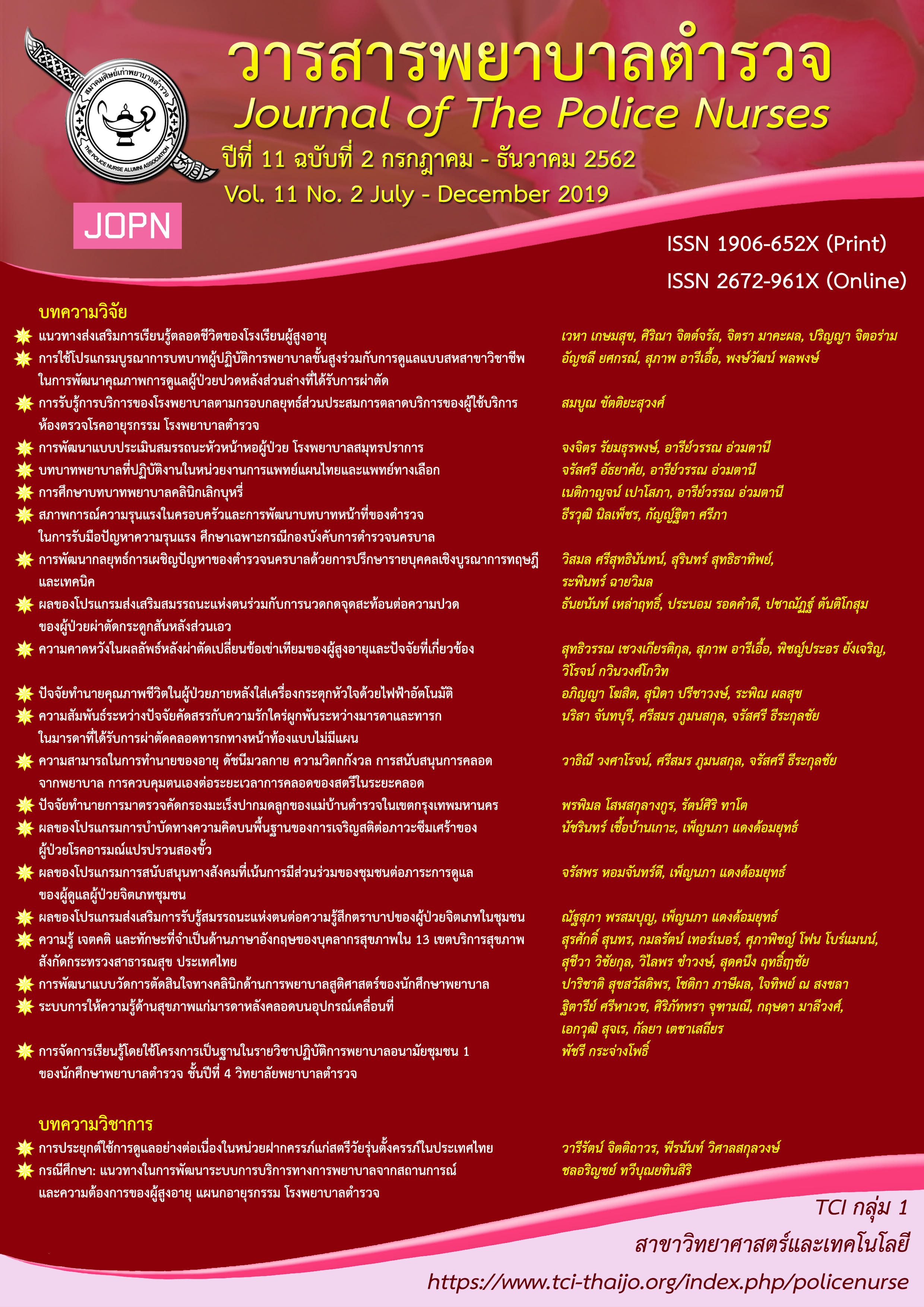THE GUIDELINE TO PROMOTE LIFELONG LEARNING FOR ELDERLY SCHOOL
Keywords:
Guidelines, Lifelong learning, Elderly schoolAbstract
The purposes of this mixed methods research were to study the needs and condition for promoting lifelong learning in elderly schools and to synthesize and propose guidelines for promoting lifelong learning of the elderly school. The sampling contained 142 stakeholders of elderly schools. Data collection techniques employed questionnaires and a focus group with 36 people consisting of 12 school Boards, 12 elderly, and 12 stakeholders in 3 best-practice elderly schools. The research instrument consisted of 2 parts: the questionnaire for the needs condition promoting lifelong learning of the elderly school, and the focus group questionnaire guideline. A panel of five experts examined content validity and index of item objective congruence (IOC) = .60 - 1.00. The content validity index (CVI) of the nstrument was .98. Quantitative data were analyzed by using descriptive statistics such as frequency, percentage, mean, standard deviation. Content analysis was employed to analyze and synthesize qualitative data. Additionally, the guidelines for promoting lifelong learning in the elderly school had been verified by eleven connoisseurship experts.
The results revealed that in overall the elderly school has a condition of promoting lifelong learning at a moderate level. In dimensions of the need for lifelong learning promotion, it was found a high level. From the synthesis of data, the results proposed schools use the SENIOR LEARNER (S-E-N-I-O-R-L-E-R-N-E-R) guidelines for promoting lifelong learning. This guideline encouraged the elderly to exercise their potential by shifting power to change the focus from that of a burden to that of power drawing on 3 elements: health, participation, and security. It was determined through the integration of the learning contents that the elderly should know, have a desire to know and want to know in order for the guideline to promote lifelong learning of the elderly.
Downloads
References
Borisuth, C., Jiradetprapai, S., Yongyuan, B., & Phoopat, P. (2014). The model of knowledge management
for development of active aging: A case study of Tambol Pakpraek Municipality Changwat Kanchanaburi. VRU Research and Development Journal Humanities and Social Science, 9(1), 26-35.
Buathong, S., Sapapad, S., & Jticharat, S. (2015). Ageing related to reason method and needs of learning. Journai of education Silpakorn university, 12(1,2), 6-17.
Bureau of Elderly Health. (2019). Elderly concern with health. Retrieved from http://hp.anamai.moph.go.th/soongwai/ statics/health/prepared/topic002.php
Department of Older Persons. (2016). The national plan on the elderly 2017-2020. Bangkok: Ministry of Social Development and Human Security.
Department of Older Persons. (2016). The Thai elderly 2014. Bangkok: Ministry of Social Development and Human Security.
Jitcharat, S., Pipatpol, K., Wongprom, J., Katessingnoy, M., Sapapad, S., Sinprasert, T., . . . Buathong, S. (2013). Organizing a learning process for specific target groups to enhance their potential Tambon Klongyong, Amphur
Phutthamonthon, Nakhon Pathom Province. Nakhon Pathom Province: Faculty of Education, Silpakorn University.
Kasemsuk, W., & Jitcharat, S. (2018). Active aging: Perspective for promoting lifelong learning. Christian University of Thailand Journal, 24(1), 149-161.
Kasemsuk, W., Piaseu, N., & Jarupat Maruo, S. (2011). Activities and primary medical care outcomes of community nurse practitioner. Thai Journal of Nursing Council, 26(2), 70-85.
Laohabut, P. (2014). The quality of life of the elderly in Moo 7 community of Plootaluang sub-district, Chon Buri province (Master of public and private management, general administration). Burapa University, Chon Buri.
National Statistical Office. (2014). The 2014 survey of the older persons in Thailand. Bangkok: Text and Journal Publication.
Office of the Education Council. (2018). Comparative research report for policy development subject: Promoting the learning of the elderly in Thailand. Bangkok: prigwhan graphic.
Office of the National Economic and Social Development Council. (2017). The twelfth national economic and social development plan (2017-2021). Bangkok.
Paolohit, W. (2011). Living longer: Living as active ageing. Royal Thai Air Force Medical Gazette, 57(2), 32-36.
Patanung, B., & Chamruspanth, V. (2013). Health promotion system for being active ageing among elderly people in Non Udom sub-district, Muangyang district, Nakhonratchasima province. Paper presented at the Graduate Research Conference 2013, Khon khaen University.
Ratana-Ubol, A., Pathumcharoenwattana, W., Pathumcharoenwattana, W., Kimpee, P., & Sajjasophon, R. (2011). Education and lifelong learning of Thai senior citizens. Bangkok: The Foundation of Thai Gerontology Research and Development Institute.
Suanmali-Nantananate, C. (2017). Adult learning theories. Nakhonpathom: Sefa Stationary.
Subcommittee on National Elderly Assembly. (2015). How to create power for aging society in ASEAN community. Bangkok: Ministry of Social Development and Human Security.
The Foundation of Thai Gerontology Research and Development Institute. (2016). Situation of the Thai elderly 2014. Bangkok: Amarin Printing & Publishing Public Company Limited.
Tongdee, J., Rongmuang, D., & Nakchatree, C. (2012). Health status and quality of life among the elderly in the southern border provinces of Thailand. Nursing Journal of the Ministry of Public Health, 22(3), 88-99.
United Nation. (2017). World population ageing 2017. Retrieved from https://population.un.org
Wold Health Organization (WHO). (2002). active ageing a policy framework. Retrieved from http://apps.who.int/ iris/bitstream/10665/67215/1/WHO_NMH_NPH_02.8.pdf
Wongprom, J., Jongwutiwes, K., Prasertsuk, N., & Jongwutiwes, N. (2015). Community participation in the development of older persons’ quality of life. Veridian E-Journal, Slipakorn University, 8(3), 41-54
Yodpet, S., Pattanasri, P., & Sakdaporn, T. (2017). The research on “good lessons learned from schools and clubs for older persons with knowledge transfer activities. Bangkok: The Foundation of Thai Gerontology Research and Development Institute.
Downloads
Published
How to Cite
Issue
Section
License
ผลงานที่ได้ตีพิมพ์แล้วจะเป็นลิขสิทธิ์ของวารสารพยาบาลตำรวจ















